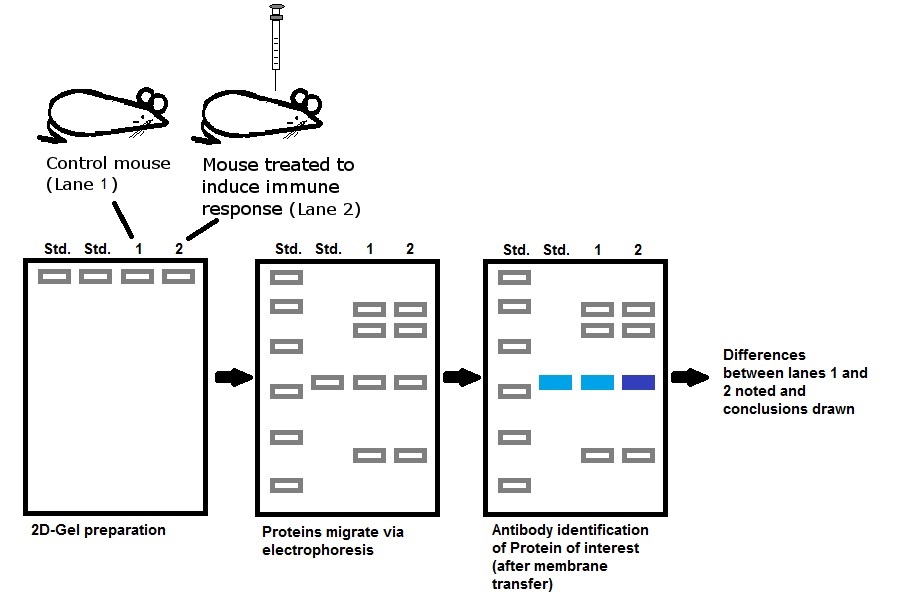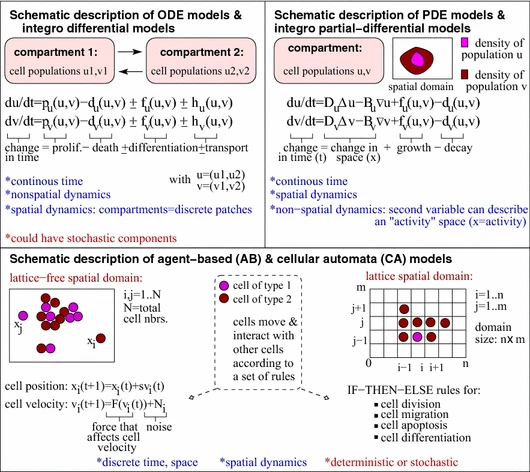|
Outline Of Immunology
The following outline is provided as an overview of and topical guide to immunology: Immunology is the study of all aspects of the immune system in all organisms. It deals with the physiological functioning of the immune system in states of both health and disease; malfunctions of the immune system in immunological disorders (autoimmune diseases, hypersensitivities, immune deficiency, transplant rejection); the physical, chemical and physiological characteristics of the components of the immune system in vitro, in situ, and in vivo. Essence of immunology Immunology * Branch of Biomedical science * Immune system * Immunity Branches of immunology * Classical immunology * Clinical immunology * Computational immunology * Diagnostic immunology * Evolutionary immunology * Systems immunology * Immunomics * Immunoproteomics * Immunophysics * Immunochemistry * Ecoimmunology * Immunopathology * Nutritional immunology * Psychoneuroimmunology * Reproductive immunology * Ci ... [...More Info...] [...Related Items...] OR: [Wikipedia] [Google] [Baidu] |
Immunity (medical)
In biology, immunity is the capability of multicellular organisms to resist harmful microorganisms. Immunity involves both specific and nonspecific components. The nonspecific components act as barriers or eliminators of a wide range of pathogens irrespective of their antigenic make-up. Other components of the immune system adapt themselves to each new disease encountered and can generate pathogen-specific immunity. Immunity is a complex biological system that can recognize and tolerate whatever belongs to the self, and to recognize and reject what is foreign (non-self). Innate and adaptive Innate Immunity First off, the immune system is a system in the body of animals that enables animals to avoid or limit many infections caused by pathogens. Pathogens are disease causing agents, causing a wide range of illnesses. As for Diseases it's when structure of an organism is negatively affected other than external injury. Both diseases and pathogens affect the immune system causing ill ... [...More Info...] [...Related Items...] OR: [Wikipedia] [Google] [Baidu] |
Nutritional Immunology
Nutritional immunology is a field of immunology that focuses on studying the influence of nutrition on the immune system and its protective functions. Part of nutritional immunology involves studying the possible effects of diet on the prevention and management on developing autoimmune diseases, chronic diseases, allergy, cancer (diseases of affluence) and infectious diseases. Other related topics of nutritional immunology are: malnutrition, malabsorption and nutritional metabolic disorders including the determination of their immune products. The Role of Nutrition on the Prevention and Management of Diseases Autoimmune diseases The development and progression of many autoimmune diseases are generally unknown. The "Western pattern diet" consists of high-fat, high-sugar, low-fiber meals with a surfeit of salt and highly processed food, which have pro-inflammatory effects. These effects may promote Th1- and Th17 - biased immunity and alter monocyte and neutrophil migration from ... [...More Info...] [...Related Items...] OR: [Wikipedia] [Google] [Baidu] |
Immunopathology
Immunopathology is a branch of medicine that deals with immune responses associated with disease. It includes the study of the pathology of an organism, organ system, or disease with respect to the immune system, immunity, and immune responses. In biology, it refers to damage caused to an organism by its own immune response, as a result of an infection. It could be due to mismatch between pathogen and host species, and often occurs when an animal pathogen infects a human (e.g. avian flu leads to a cytokine storm which contributes to the increased mortality rate). When a foreign antigen enters the body, there is either an antigen specific or nonspecific response to it. These responses are the immune system fighting off the foreign antigens, whether they are deadly or not. Immunopathology could refer to how the foreign antigens cause the immune system to have a response or problems that can arise from an organism's own immune response on itself. There are certain problems or faults in ... [...More Info...] [...Related Items...] OR: [Wikipedia] [Google] [Baidu] |
Ecoimmunology
Ecoimmunology or Ecological Immunology is the study of the causes and consequences of variation in immunity. The field of ecoimmunology seeks to give an ultimate perspective for proximate mechanisms of immunology. This approach places immunology in evolutionary and ecological contexts across all levels of biological organization. Classical, or mainstream, immunology works hard to control variation (inbred/domestic model organisms, parasite-free environments, etc.) and asks questions about mechanisms and functionality of the immune system using a reductionist method. While ecoimmunology originated from these fields, it is distinguished by its focus to explain natural variation in immune functions. Multiple institutes engage in ecoimmunological research, such as the Center for Immunity, Infection and Evolution at the University of Edinburgh and the Max Planck Institute for Immunoecology and Migration. The US National Science Foundation has funded a Research Coordination Network ... [...More Info...] [...Related Items...] OR: [Wikipedia] [Google] [Baidu] |
Immunochemistry
Immunochemistry is the study of the chemistry of the immune system. This involves the study of the properties, functions, interactions and production of the chemical components (antibodies/immunoglobulins, toxin, epitopes of proteins like CD4, antitoxins, cytokines/chemokines, antigens) of the immune system. It also include immune responses and determination of immune materials/products by immunochemical assays. In addition, immunochemistry is the study of the identities and functions of the components of the immune system. Immunochemistry is also used to describe the application of immune system components, in particular antibodies, to chemically labelled antigen molecules for visualization. Various methods in immunochemistry have been developed and refined, and used in scientific study, from virology to molecular evolution. Immunochemical techniques include: enzyme-linked immunosorbent assay, immunoblotting (e.g., Western blot assay), precipitation and agglutination reaction ... [...More Info...] [...Related Items...] OR: [Wikipedia] [Google] [Baidu] |
Immunophysics
Immunophysics is a novel interdisciplinary research field using immunological, biological, physical and chemical approaches to elucidate and modify immune-mediated mechanisms and to expand our knowledge on the pathomechanisms of chronic immune-mediated diseases such as arthritis, inflammatory bowel disease, asthma and chronic infections. Background Immune reactions are tightly regulated and usually self-limited. Dysregulation can result in chronic inflammatory diseases (immunochronicity). In addition to biochemical molecular mechanisms, physical factors influence the immune system. Such components include: * Microenvironmental factors like tonicity, pH, oxygen pressure and the redox status of immune cells * Mechanical factors, such as tissue pressure, cellular stiffness and cell motility * Cell membrane physics such as membrane composition and particles The research field of immunophysics aims to investigate the influence of these physicochemical parameters on the function of the i ... [...More Info...] [...Related Items...] OR: [Wikipedia] [Google] [Baidu] |
Immunoproteomics
Immunoproteomics is the study of large sets of proteins (proteomics) involved in the immune response. Examples of common applications of immunoproteomics include: * The isolation and mass spectrometric identification of MHC (major histocompatibility complex) binding peptides * Purification and identification of protein antigens binding specific antibodies (or other affinity reagents) * Comparative immunoproteomics to identify proteins and pathways modulated by a specific infectious organism, disease or toxin. The identification of proteins in immunoproteomics is carried out by techniques including gel based, microarray based, and DNA based techniques, with mass spectroscopy typically being the ultimate identification method. Applications Immunology Immunoproteomics is and has been used to increase scientific understanding of both autoimmune disease pathology and progression. Using biochemical techniques, gene and ultimately protein expression can be measured with high fideli ... [...More Info...] [...Related Items...] OR: [Wikipedia] [Google] [Baidu] |
Immunomics
Immunomics is the study of immune system regulation and response to pathogens using genome-wide approaches. With the rise of genomic and proteomic technologies, scientists have been able to visualize biological networks and infer interrelationships between genes and/or proteins; recently, these technologies have been used to help better understand how the immune system functions and how it is regulated. Two thirds of the genome is active in one or more immune cell types and less than 1% of genes are uniquely expressed in a given type of cell. Therefore, it is critical that the expression patterns of these immune cell types be deciphered in the context of a network, and not as an individual, so that their roles be correctly characterized and related to one another. Defects of the immune system such as autoimmune diseases, immunodeficiency, and malignancies can benefit from genomic insights on pathological processes. For example, analyzing the systematic variation of gene expressio ... [...More Info...] [...Related Items...] OR: [Wikipedia] [Google] [Baidu] |
Systems Immunology
Systems immunology is a research field under systems biology that uses mathematical approaches and computational methods to examine the interactions within cellular and molecular networks of the immune system. The immune system has been thoroughly analyzed as regards to its components and function by using a "reductionist" approach, but its overall function can't be easily predicted by studying the characteristics of its isolated components because they strongly rely on the interactions among these numerous constituents. It focuses on ''in silico'' experiments rather than ''in vivo''. Recent studies in experimental and clinical immunology have led to development of mathematical models that discuss the dynamics of both the innate and adaptive immune system. Most of the mathematical models were used to examine processes ''in silico'' that can't be done ''in vivo''. These processes include: the activation of T cells, cancer-immune interactions, migration and death of various immune c ... [...More Info...] [...Related Items...] OR: [Wikipedia] [Google] [Baidu] |
Evolutionary Immunology
Immunology is a branch of medicineImmunology for Medical Students, Roderick Nairn, Matthew Helbert, Mosby, 2007 and biology that covers the medical study of immune systems in humans, animals, plants and sapient species. In such we can see there is a difference of human immunology and comparative immunology in veterinary medicine and animal biosciences. Immunology measures, uses charts and differentiate in context in medicine the studies of immunity on cell and molecular level, and the immune system as part of the physiological level as its functioning is of major importance. In the different states of both health, occurring symptoms and diseases; the functioning of the immune system and immunological responses such as autoimmune diseases, allergic hypersensitivities, or in some cases malfunctioning of immune system as for example in immunological disorders or in immune deficiency, and the specific transplant rejection) Immunology has applications in numerous disciplines of me ... [...More Info...] [...Related Items...] OR: [Wikipedia] [Google] [Baidu] |




